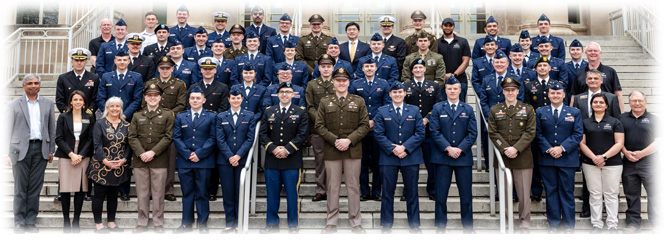PMRI Overview
The Purdue Military Research Institute (PMRI) began in the Fall of 2014 to focus on synergistic collaboration with our military partners by offering access to some 1900 faculty conducting world-class research in numerous research areas of significant interest to the Department of Defense. The PMRI partners with the Army, Navy and Marines, Air Force, and Space Force in three focus areas:
- Merit-based fellowships for active-duty military members that cover all costs for graduate degree programs (except for books and incidental costs around graduation).
- Summer intern program for undergraduates from the military academies, Purdue ROTC, and select student veterans from other US universities/colleges.
- Faculty exchange program.
In a world of rapidly increasing technology and surges in threat, PMRI seeks to develop defense and security leaders who, beyond excellence in military leadership, are highly capable problem solvers in a variety of STEM and non-STEM disciplines. Since 2014, over 170 military officers have successfully completed their advanced academic degrees at Purdue with a 99+% on-time graduation rate.
Conference Theme
Innovation through Teamwork: We aim to maximize a US strategic national defense advantage by expanding the partnership between the defense, academic, and innovation ecosystems. This conference will bring together defense and security program faculty, students, and external stakeholders to convene an annual event highlighting PMRI research, engagement, and impact.
Conference Objectives
- Build a network of stakeholders willing to lead in promoting PMRI-related goals.
- Share and highlight research of our PMRI students and faculty, and stakeholders.
- Share PMRI experiences of collaboration with partner institutions.
Conference Topics
With an exciting theme for the upcoming conference, we invite paper submissions on relevant topics, including:
- Topic Area 1: Emerging Defense Research. Topics include biotechnology, quantum science, future generation wireless technology, microelectronics, autonomous systems, sensing, advanced materials, or other defense and security areas of emerging research.
- Topic Area 2: Defense and Security Area of Application and Adoption. Topics include AI and autonomy, cyber, systems-of-systems, microelectronics, space technology, space domain access and awareness, defense energy systems, computing, software and human-machine interfaces, and other related areas.
- Topic Area 3: Defense-Specific Areas. Topics include directed energy, hypersonics, advanced sensors, advanced energetic materials, directed energy, advanced materials, advanced manufacturing, and other related areas.
- Topic Area 4: Teamwork and Mission Focused Research. Topics include selection of advanced degree priorities, building defense-university partnerships, disaster response & recovery, building a solutions-oriented workforce, human performance, augmented cognition, built environment, and other human performance-related areas.



